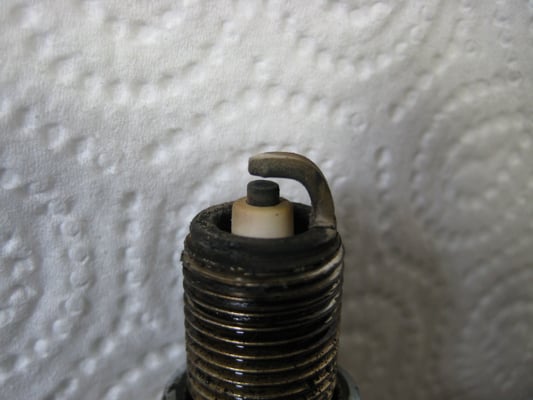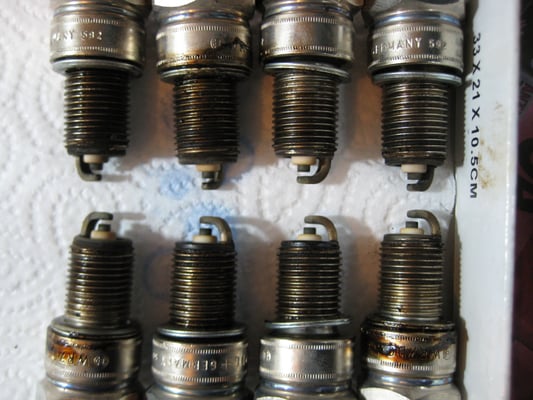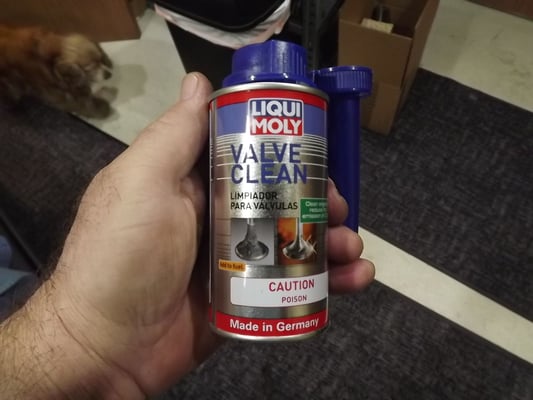Compression Test Expectation
#31
Rennlist Member
928 engines that have a cylinder or cylinders that are up to 40% lower than the best cylinder can fool people.
Therefore, I'm very conservative when reacting to compression readings. I never trust my first compression test on a 928 engine I've not worked on, before. I need to see compression test "problems" more than once, on the same cylinder.
928 engines have very low valve spring pressure and a tiny bit of carbon between the valve and the seat can result in a low cylinder or several low cylinders.
If I have an engine with a low cylinder on an engine, I'll always make sure the pieces involved in making spark and injecting fuel are perfect and then send the car back put to be driven. Sometimes I'll even do a carbon cleaning proceedure and run a carbon cleaning additive in the fuel.
I'll then retest in a couple of weeks.
A huge majority of the time, there won't be a problem. The "bit" of carbon will be pounded/blown out and the compression will return to normal.
Of course, if there is a test that results in one (or more than one) cylinder with 0 to 30 pounds of compression, that's a completely different story.
Therefore, I'm very conservative when reacting to compression readings. I never trust my first compression test on a 928 engine I've not worked on, before. I need to see compression test "problems" more than once, on the same cylinder.
928 engines have very low valve spring pressure and a tiny bit of carbon between the valve and the seat can result in a low cylinder or several low cylinders.
If I have an engine with a low cylinder on an engine, I'll always make sure the pieces involved in making spark and injecting fuel are perfect and then send the car back put to be driven. Sometimes I'll even do a carbon cleaning proceedure and run a carbon cleaning additive in the fuel.
I'll then retest in a couple of weeks.
A huge majority of the time, there won't be a problem. The "bit" of carbon will be pounded/blown out and the compression will return to normal.
Of course, if there is a test that results in one (or more than one) cylinder with 0 to 30 pounds of compression, that's a completely different story.
#32
Former Vendor
#33
Shameful Thread Killer
Rennlist Member
Rennlist Member
Requires getting the cam cover off. But - along with rope, might solve the issue. Lets not forget these are direct acting valve on lobe, so no rocker.
#35
Those things are called spark plugs! 
Take the car for a spin for half an hour, do a couple of full rev blasts in first or second and when you get back home do a compression test on the cylinder that gave a low reading. If it is still reading low put the spark plug back in and forget about it unless you have some reason to believe the car is down on performance.
Unless you are a complete numb nuts there is no mistaking when the engine is only running on 7 cylinders- you can tell that without even leaving the garage. If you were seriously down on compression pressure in one cylinder the fuel would not burn correctly and the plug would be either very sooty or wetted with unburnt fuel.

Take the car for a spin for half an hour, do a couple of full rev blasts in first or second and when you get back home do a compression test on the cylinder that gave a low reading. If it is still reading low put the spark plug back in and forget about it unless you have some reason to believe the car is down on performance.
Unless you are a complete numb nuts there is no mistaking when the engine is only running on 7 cylinders- you can tell that without even leaving the garage. If you were seriously down on compression pressure in one cylinder the fuel would not burn correctly and the plug would be either very sooty or wetted with unburnt fuel.
#36
Thread Starter
Drifting
Unless you are a complete numb nuts there is no mistaking when the engine is only running on 7 cylinders- you can tell that without even leaving the garage. If you were seriously down on compression pressure in one cylinder the fuel would not burn correctly and the plug would be either very sooty or wetted with unburnt fuel.
However, my assumptions are often wrong which is why I was looking for confirmation here
#37
Rennlist Member
Increasing the LSA reduces the overlap
and as I understand causes the values generated in a compression test to increase for a common cam profile
If only the exhaust was retarded - opened/closed later, which will also increase the LSA, then there will be no change in the compression numbers.
The point is, it is important to know which lobe was changed to change the LSA. But a simple compression test will tell you that.
#38
Administrator - "Tyson"
Lifetime Rennlist
Member
Lifetime Rennlist
Member
Unless you are a complete numb nuts there is no mistaking when the engine is only running on 7 cylinders- you can tell that without even leaving the garage. If you were seriously down on compression pressure in one cylinder the fuel would not burn correctly and the plug would be either very sooty or wetted with unburnt fuel.
Compression was even across all 5 cylinders. Since the 20V is such a rare engine around these parts I loaned my identical car for testing / comparison (things like good ECU's for that Mitsubishi injection system are difficult to come by).
Nothing fixed the issue, then they decided to do a leak down test. Yup, bent valves in every cylinder.
Talking to the owner, something "clicked" in his brain and he recalled shifting into 2nd instead of 4th and way over spinning the engine resulting in valve float and very minor valve to piston contact.
I drove the car, it ran absolutely perfect unless it was under load above 5k rpm.
#39
This is true only if the intake was advanced - opened/closed sooner, which will increase LSA.
If only the exhaust was retarded - opened/closed later, which will also increase the LSA, then there will be no change in the compression numbers.
The point is, it is important to know which lobe was changed to change the LSA. But a simple compression test will tell you that.
Rgds
Fred
#40
Rennlist Member

Running is a choice too, but saves a heat cycle and reassembly deep in a 100hr/annual inspection.
#42
Years ago a 20V 5-cylinder Audi came in to our local Indy shop, idled fine, ran down the highway fine....trying to wind it out to redline it would misfire upstairs.
Compression was even across all 5 cylinders. Since the 20V is such a rare engine around these parts I loaned my identical car for testing / comparison (things like good ECU's for that Mitsubishi injection system are difficult to come by).
Nothing fixed the issue, then they decided to do a leak down test. Yup, bent valves in every cylinder.
Talking to the owner, something "clicked" in his brain and he recalled shifting into 2nd instead of 4th and way over spinning the engine resulting in valve float and very minor valve to piston contact.
I drove the car, it ran absolutely perfect unless it was under load above 5k rpm.
Compression was even across all 5 cylinders. Since the 20V is such a rare engine around these parts I loaned my identical car for testing / comparison (things like good ECU's for that Mitsubishi injection system are difficult to come by).
Nothing fixed the issue, then they decided to do a leak down test. Yup, bent valves in every cylinder.
Talking to the owner, something "clicked" in his brain and he recalled shifting into 2nd instead of 4th and way over spinning the engine resulting in valve float and very minor valve to piston contact.
I drove the car, it ran absolutely perfect unless it was under load above 5k rpm.
Personally, I always recommend folks do a leak down test to compliment the compression test otherwise it is a bit like having fish and chips without the fish- an incomplete meal as it were.
Having done 165 mph on the "Ring" [or wherever] it is a pretty safe bet that there is nothing wrong with that motor unless something let go on the way home- possible but not probable or so I would think.
#43
PV=NRT. Not reading from Wiki so my apology. Adiabatic heating of compression will have a significant affect on the final reading. Also, if it is a mechanical gauge, there is the hysteresis of the bourdon tube works.
Continental engine works has done quite a bit of research on compression(static and dynamic) for aircraft engines, as well as tractor engines. They have found that readings as low as 75% of the 'book' value of a static comp test will still make rated power. It's not completely understood, but it is the way it works in real life.
While static comp tests are somewhat useful, compound compression tests are more revealing in finding issues with the upper cylinder. Air leaks can be heard going through the rings from the oil filler, or through the valves from the intake or exhaust. A benchmark is usually set when an engine is new and broken in for aircraft and that becomes the standard for losses along the way. If 80PSI is put in at TDC under a calibrated fixed orifice, the resulting losses should be evaluated as the engine ages.
Continental engine works has done quite a bit of research on compression(static and dynamic) for aircraft engines, as well as tractor engines. They have found that readings as low as 75% of the 'book' value of a static comp test will still make rated power. It's not completely understood, but it is the way it works in real life.
While static comp tests are somewhat useful, compound compression tests are more revealing in finding issues with the upper cylinder. Air leaks can be heard going through the rings from the oil filler, or through the valves from the intake or exhaust. A benchmark is usually set when an engine is new and broken in for aircraft and that becomes the standard for losses along the way. If 80PSI is put in at TDC under a calibrated fixed orifice, the resulting losses should be evaluated as the engine ages.





